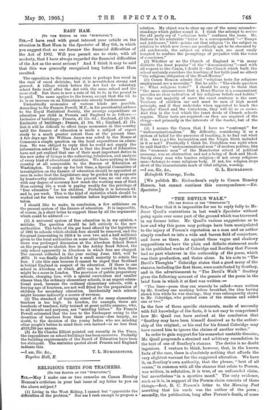[TO THR EDITOR or THE "SPECTATOR.") have read with great
interest your article on the situation in East Ham in the Spectator of May 6th, in which you suggest that no one foresaw the financial difficulties of the Act of 1902. Will you permit me to state, with all modesty, that I have always regarded the financial difficulties of the Act as the most serious ? And I think it may be said that this was generally recognised long before East Ham
revolted.
The opposition to the increasing rates is perhaps less vocal in the case of rural districts; but it is nevertheless strong and general. A village which before the Act had its voluntary school finds itself after the Act with the same school and the same staff. But there is now a rate of Gd. to ls. in the pound to be paid. The same applies to the towns, except that the Gd. to ls. is an increase on an Education-rate already burdensome.
Undoubtedly economies of various kinds are possible. According to Sir Francis Powell, M.P., in his presidential address to the Royal Statistical Society, the average expenditure on education per child in Prussia and England is as follows :— Inclusive of buildings : Prussia, 41 15s. 6d. England, 4212s. 9d. Exclusive of buildings : Prussia, £1 10s. id.; England, £1 17s. But it will be difficult to effect large economies in this country until the finance of education is made a subject of export study to a much greater extent than at the present time. A few days ago Sir William Anson was asked in the House of Commons a simple question on the local expenditure on educa- tion. He was obliged to reply that he could not supply the information asked for. The fact is that the Board of Education have not yet realised that one of their most important duties in the new order of things is the collecting, tabulation, and analysis of every kind of educational statistics. We have nothing in this country at all comparable to the Bureau of Education at Washington. To make up for lost time, a. Special Committee of investigation on the finance of education should be appointed at once in order that the Legislature may be guided in its proposals by trustworthy statistics. At the present time, no one can see with any degree of accuracy how much the working man of East Ham earning 25s. a week is paying weekly for the privilege of "free education " for his children. Probably it is between 6d. and ls. per week. This is the kind of statistics which should be worked out for the various localities before legislative action is taken.
I should like to make, in conclusion, a few criticisms on the present system of the finance of education. It is impossible, of course, in a short letter to support these by all the arguments which could be adduced :- (1) A universal system of free education is, in my opinion, a mistake. The question should be left entirely to the new authorities. The bribe of 10s. per head offered by the legislation of 1891 to schools which abolish fees should be removed, and the fee-grant (amounting in 1903-4 to over two and a half millions) given to the local authorities on some other basis. On April 28th there was prolonged discussion at the Aberdeen School Board on the proposal to abolish fees in the Ashley Road School, the only school apparently in Aberdeen in which fees are charged. The amount collected in the year ending June, 1905, will be 4670. It was finally decided by a small majority to retain the fees. I cite this case because it cannot be urged that Scotland is behind England in respect of its education. If there is one school in Aberdeen at which £670 can be raised in fees, there might be a score in London. The provision of public preparatory schools, charging fees, with a special curriculum and smaller classes than the ordinary elementary schools, is an urgent educa- tional need, because the ordinary elementary schools, with a leaving age of fourteen, are not well fitted for the preparation of children for secondary education. Incidentally such schools might become indirectly a source of revenue. (2) The standard of training aimed at for many elementary teachers is too high. In London, for example, there are hundreds of teachers, fully trained at great public expense, who, to all intents and purposes, are "minding babies." Sir Francis Powell estimated that the loss to the Exchequer owing to the desertion of teachers from their profession—due largely, no doubt, to the decision of the young ladies who are minding other people's babies to mind their own instead—is no less than X323,239 per annum.
(3) As Sir Charles Elliott pointed out recently in the Times, the expenditure on school buildings has been excessive. Probably the building requirements of the Board of Education have been too stringent. The statistics quoted about Prussia and England indicate this.






































 Previous page
Previous page